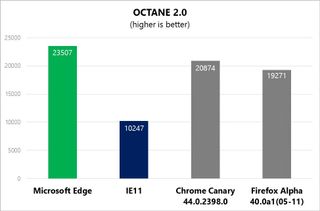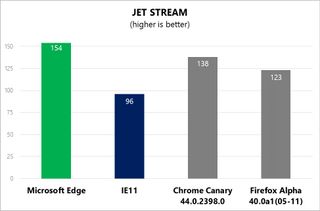Microsoft Edge is already beating IE, Chrome and Firefox in JavaScript benchmarks

Microsoft has yet to complete its development of Windows 10, but it is already promoting the improvements in performance for Microsoft Edge, the browser that will be included in the new OS. Specifically, the JavaScript performance is already beating out the old Internet Explorer, along with Google's Chrome and Mozilla's Firefox, in two separate benchmark tests.
In a highly technical blog post, Microsoft talked about how it was trying to improve the Chakra JavaScript engine for Microsoft Edge. For example, Microsoft looked at a random sample of around 4,000 sites, out of the top 10,000 sites on the Internet, and found that 95% of them had minified code, which compresses the original code to its smallest size. The blog states:
"The experiment confirmed that usage of minified code is extremely popular on the web as it exists and amongst others, UglifyJS is very commonly used in today's web. So in Windows 10 and Microsoft Edge, we've added new fast paths, improved inlining and optimized some heuristics in Chakra's JIT compiler to ensure that minified code runs as fast, if not faster than the non-minified versions. With these changes, the performance of individual code patterns minified using UglifyJS that we tested, improved between 20-50%."
To most of us, that's a lot of jargon to take in, but there's a simple way to show the increase in performance: use benchmarks. Microsoft decided to use the Octane 2.0, developed by Google, to look at JavaScript numbers for the 64-bit versions of Edge, IE, Chrome and Firefox running on Windows 10:

As you can see, Edge blows IE away and also beats Chrome and Firefox. The browser team also used Apple's Jet Stream benchmark and got similar results:

The blog states:
"While winning on a benchmark that is not created by us does feel nice, the key is that Microsoft Edge has already come a long way from IE11 in terms of improved JavaScript performance on both, benchmarks and real world web as it exists today. As mentioned in the beginning, performance is a never-ending pursuit. We will continue pushing the performance boundaries for JavaScript in Microsoft Edge."
Source: Microsoft Edge blog
Get the Windows Central Newsletter
All the latest news, reviews, and guides for Windows and Xbox diehards.

